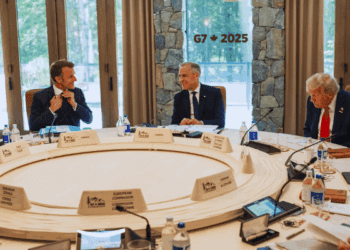This article originally appeared in The Hub.
By Richard Shimooka, May 12, 2025
In the days leading up to and during his meeting with Donald Trump, Prime Minister Carney repeatedly stressed how seriously he was still taking national security and defence, saying that it remained a high priority for his government. This echoed his sentiments from the campaign trail, where, not surprisingly, given the precarity Canadians have been feeling regarding our relationship with America, Canada’s inability to project strength became a focal point of the election.
Now that he’s in office, though, what is he going to do about it? Beyond spending commitments, Carney is about to make one of his most consequential decisions for national defence: who will be his minister.
While not historically given the cache or attention as other high-profile ministries such as finance or justice, national defence is the most unique department in the government. It oversees the Canadian Armed Forces, a historic and obviously important institution for the state’s fundamental security. It is (usually) the department with the largest discretionary spending, with large, highly technical and complex projects that require deep levels of expertise.
There are intangible cultural aspects to the position too. They’re the only civilian accepted into the military’s highly inclusive culture. As part of this, the position has accoutrements that no other minister gets: military officials saluting you and a grand swearing-in ceremony. It requires a level of protocol that exceeds that of any other department.
Yet despite its importance and uniqueness, national defence has not received the quality of leadership the position demands lately. The prevailing trend over the past several decades has been to put politically reliable but not very adept managers into the portfolio. Essentially, ones that can be trusted to oversee the file and suppress or avoid political risk to the leadership.
Generally, these have either been MPs of a mediocre calibre, or a dumping ground for political rivals. Doug Bland, one of the few chroniclers of national defence administration in Canada, once quipped that the minister’s position is where “political careers go to die.”
This is because defence does not provide the same“good news” announcements like other departments that garner positive public sentiments. Lately, being the minister of national defence is a bit akin to being a bad landlord—constantly covering up broken amenities while pushing off paying for necessary repairs.
Greater centralization in the prime minister’s office has also robbed a lot of discretion the position enjoyed in the past. Rather than being empowered to act as necessary to address the country’s national security needs, the last several ministers have been charged with implementing policies that, while perhaps politically advantageous for the government, are ill-suited for the hard realities facing the CAF and poorly calibrated to the unique language and processes of the Department of National Defence. This has led to growing disillusionment on all sides, with many in both political and military leadership fundamentally distrustful of the other.
Aligning political necessities with on-the-ground needs and restoring the effectiveness of DND and the CAF while attempting to navigate increasingly unsteady international waters will be no small tasks for whoever the new minister turns out to be.
Who should Carney choose?
What qualities, then, should Carney be looking for in whomever he appoints?
One line of argument is that the minister should be a diplomatic voice to smooth over Canada’s defence relationship with its allies. This is plainly wrongheaded. Canada does not need a diplomat in this role; it needs an experienced and effective manager. Appointing someone who can simply explain away Canada’s defence shortcomings when our allies rightly question them would be a worrying sign of how Carney truly feels about the importance of this file—Canada’s allies are not simply misinformed about our situation; rather, they despair at the actual state of Canada’s defence spending and standing forces. The greatest diplomacy we can engage in is tangibly improving our military capability.
If national security really is a major priority for this government, Carney must appoint one of his most adept MPs to the position and provide them the authority to actually implement the hard but necessary policies required to reform Canada’s moribund security apparatus. They will need the acumen to understand the complex problems of defence in Canada, the capacity to analyze the advice they are given (and the humility to consider it), and the fortitude to take calculated risks.
Most importantly, he or she will need to be comfortable with a fair amount of failure. This last point demands that they possess the full confidence and unwavering support of the prime minister. They will need to have the authority to sit at the cabinet table and tell other ministers exactly why the decisions they make are necessary and the political acumen to galvanize the necessary support.
The list of potential candidates who tick each of these boxes is small.
By all accounts, Anita Anand possessed all of the necessary criteria while on the job previously—except the last one: she could not get the political support necessary to push through defence spending increases and resigned as a result. If Carney can provide her with enough political capital for a more successful second stint, she would be an able option. Dominic LeBlanc, Trudeau’s most capable lieutenant by the end of his tenure, is another serious option. Bill Blair, the incumbent minister of national defence, might not seem like an inspiring choice—but he has shown adeptness at the job and is well-liked in the department.
The bottom line is that Carney can talk all he wants about security and steeling Canada’s defences, but his actions must back up the seriousness of his words. His choice of minister will provide insight into what Canadians can expect on this file—an actual reorientation of the government’s priorities, or more of the all-talk-and-no-follow-through approach that characterized the Trudeau years.
The CAF—and the country—cannot afford the latter. It’s one thing to proclaim “elbow’s up!” on the campaign trail; it’s another thing entirely to keep them up when you’re actually on the ice.






